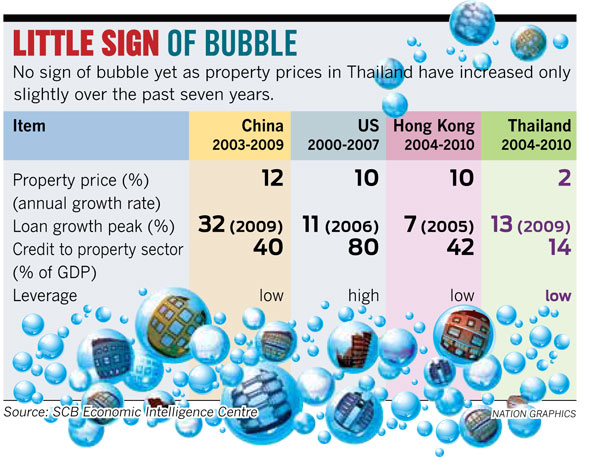Developers believe that the property market shows no signs of a bubble even though most of them have launched residential projects with a combined 60,500 units worth more than Bt200 billion from January to November 14.
 However, the Bank of Thailand’s move to cap the loan-to-value ratio at 90 per cent for condominiums, effective on January 1, and 95 per cent for low-rises, effective on January 1, 2012, will brake real-estate growth next year, they said yesterday.
However, the Bank of Thailand’s move to cap the loan-to-value ratio at 90 per cent for condominiums, effective on January 1, and 95 per cent for low-rises, effective on January 1, 2012, will brake real-estate growth next year, they said yesterday.
At a seminar conducted by the Real Estate Information Centre (REIC), the Thai Condominium Association, the Thai Real Estate Association and the Business Housing Association, they called on the central bank to join with the REIC and make use of its database before launching restrictions to sedate the market.
Thumrong Panyasakulwong, president of the Thai Condominium Association, said that if the central bank was convinced that the property market is overheated, it should use another approach to regulate the market. The loan-to-value measure would not produce the results intended by the central bank.
The association does not see the property market, especially the condo segment, heading for a crash because commercial banks now have limited project loans for developers and mortgages for home-buyers. This process can control the market.
The real-estate market is dominated by 10 developers, as there are fewer small and medium players in the market than before the financial crisis of 1997. That leads the association to conclude that the current market is not facing a bubble problem, he said.
Issara Boonyong, president of the Business Housing Association, said that in the first nine months of this year only 23,000 new condo units were registered. That figure is lower than the 29,000 registrations for new low-rise residences, including single-family homes, townhouses and duplexes. That shows that the condo market continues to be smaller than before the financial crisis of 1997.
Total residential registrations, combining new and resale units, were up by only 6,000 units to 136,000 units in the first nine months of this year from the same period last year.
“We believe that total residential registrations, for both new and resale homes, will reach 170,000 units by year-end, with 49 per cent from resales and the rest from new sales,” Issara said. “That is only 5 per cent above last year and still lower than the financial crisis in 1997, so we don’t believe that the property market is experiencing a bubble.”
However, the central bank measure may stall growth in the property market next year, he added.
Advice to BOT
If the authorities want to restrain the property market, they need to cooperate and get information from the REIC and other organisations that do surveys and research on the market before making a decision to launch any measure that would kill off this sector, he said.
Kittipol Pramote na Ayudhya, president of the Thai Real Estate Association, said the property market in the second half of this year had under-performed the first half after the tax incentive expired. However, foreign investors have returned to the residential market.
The central bank measure will sweep speculators out of the market, but leave real demand untouched, he said.
Samma Kitsin, director-general of the REIC, said the condo inventory in the market was now only 27,700 units out of the 120,700 units put on sale in the first half of this year.
However, from July until mid-November, new condo projects have added 40,500 units to the supply.
The popular locations are Huai Khwang with 9,500 units, followed by Chatuchak with 8,900 units, Klong San with 5,000, Bang Phlat with 4,900 and Watthana with 4,800.



